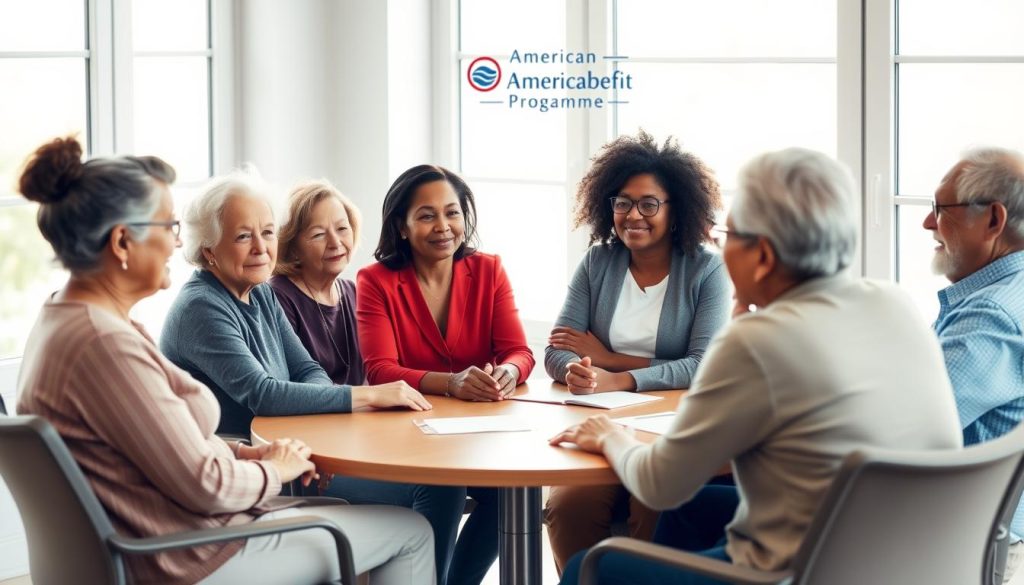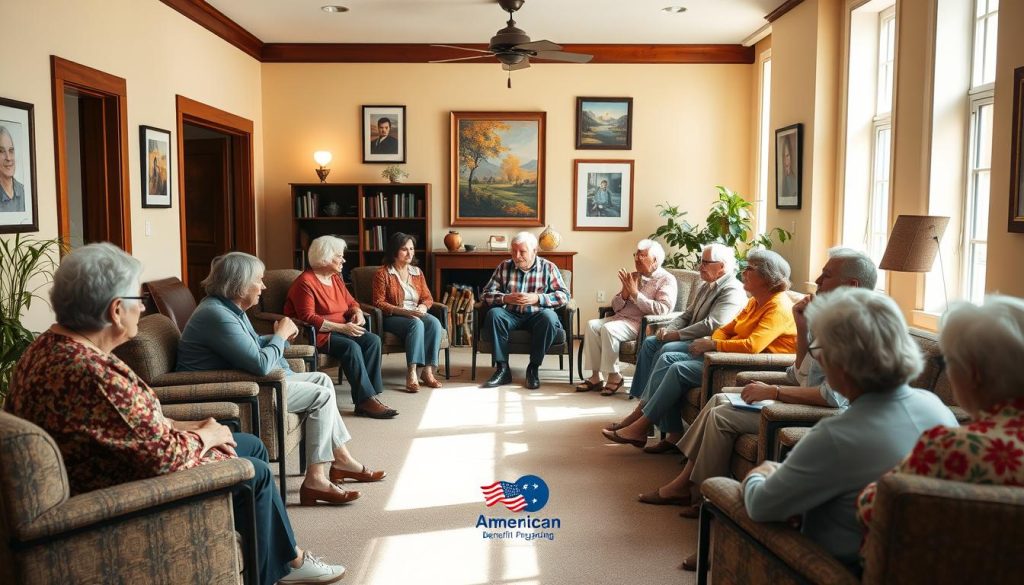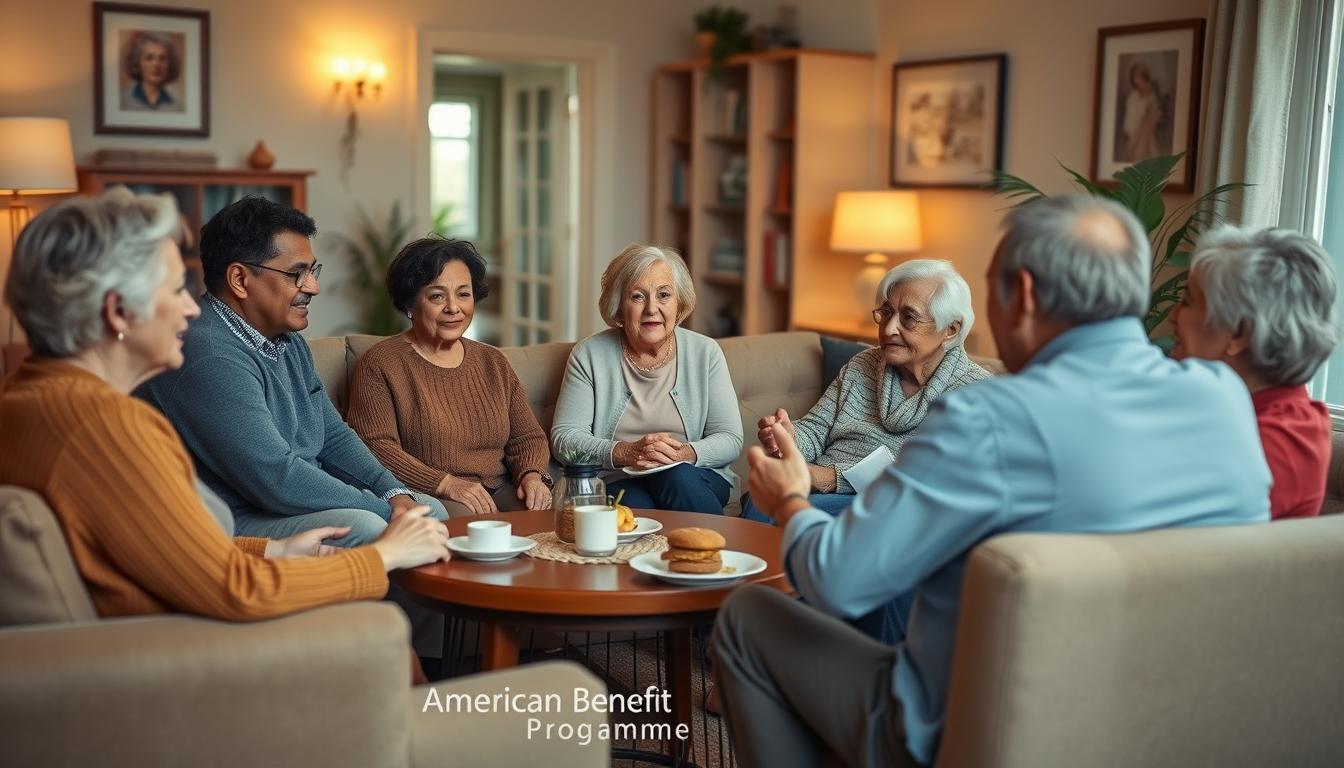Have you ever asked yourself why elder care disputes cause so much drama? It’s because talking about these issues can be really hard. They touch on emotions and create misunderstandings. Elder mediation can turn fights into teamwork. It’s a way for families to make tough choices about their elders without ruining relationships.
When our loved ones get older, figuring out how to solve family disagreements is key. Mediation improves how families talk things out. It makes sure everyone is listened to and valued. With mediation, decisions are made faster and everyone works together better. This makes caring for aging family members less stressful12. Knowing how elder mediation works is important for handling these issues.
Key Takeaways
- Elder family mediation fosters a collaborative environment, leading to effective conflict resolution.
- This process helps families address caregiving decisions efficiently, saving time and emotional strain.
- Elders gain a voice in the decision-making process, reinforcing their dignity and independence.
- Structured mediation sessions can optimize communication and reduce conflicts within families.
- Choosing the right mediator is essential for navigating emotional complexities and legal concerns.
- Community resources can offer affordable mediation services, making it accessible for more families.
- Ultimately, elder family mediation plays a crucial role in preserving family relationships during challenging times.
Understanding Elder Family Mediation
Elder family mediation is essential for families dealing with aging relatives. A mediator helps family members talk about elder care. The goal is to help families work together to solve problems.
What Is Elder Family Mediation?
Elder family mediation helps families with elder care challenges. It is a private, confidential way to make decisions. Everyone gets to share their thoughts. Meetings usually last two hours but can take longer3. Mediators with special training make sure talks go well3.
Importance of Mediation in Elder Care
Mediation is key for elder care issues. It saves time, money, and stress compared to court4. Starting early is best. It keeps families and finances safe4. Mediation works well early on to prevent fights4. Experts like lawyers and care managers help make good choices together5.
In the end, elder family mediation helps make good decisions together. It keeps families working well together during big changes45.
The Benefits of Elder Family Mediation
Elder family mediation helps solve family conflicts better. It encourages families to talk openly, which improves understanding. Through teamwork, families discuss their issues calmly without making things worse.
Improved Communication Among Family Members
Elder family mediation makes talking within families easier. Everyone gets to share their feelings, reducing confusions. Talking about money, health choices, and caring duties gets easier with guidance67.
Preservation of Family Relationships
Keeping family ties strong is important. Mediation fixes old issues focusing on common goals. Brothers and sisters work together finding solutions. This lessens fights and brings families closer6.
Empowering Elders in Decision-Making
Mediation gives older adults a voice in their care. They help make decisions, which respects their independence. This process finds solutions quickly, making their opinions key in family choices67.
The Elder Mediation Process
The elder mediation process helps families deal with aging parent care challenges. It starts with meetings where mediators talk to each family member. This step is key to making sure everyone can share openly. It helps make later group talks work better.
Initial Consultations with Family Members
In the first meetings, mediators have private chats with each family member. This helps understand everyone’s views on care, money, and how the family works. It’s important that these chats are private. This way, people can share worries without being scared of getting judged. Clear talking makes it easier for families to find solutions together later on.
Joint Mediation Sessions
After the first meetings, families come together for joint sessions. These might happen online to fit everyone’s schedules. The aim is to make sure everyone’s ideas are considered. This helps make better decisions about elder care. Even when families disagree about care or money, mediation offers a way to find fair solutions for all. Elder mediation is quicker and cheaper than going to court. It helps families stay peaceful while making important care decisions89.
As families talk more, they tend to find solutions that work for everyone. This keeps the elder’s best interests a top priority10. Mediators guide families through tough topics like nursing home choices and estate plans. This helps everyone understand and agree on what’s best.Learn more about the mediation process and why it’s good for families.
Choosing the Right Mediator for Elder Care
Finding the right mediator is key in elder care talks. Look for someone with experience in helping seniors. They will make sure everyone is listened to and understood.
Finding a Qualified Elder Care Mediator
It’s important to check a mediator’s background. Look for those trained in solving conflicts, elder care, or in areas like law or social work. For example, Elder Law of East Tennessee provides services that blend legal knowledge with elder care insights11. They handle both the heart and the practical sides of family issues.
What to Look for in Mediation Services
Keep these points in mind when picking mediation services for older folks:
- Experience: Choose mediators with strong experience in elder care, like Amelia Crotwell who brings twelve years of expertise11.
- Cost: Know the costs. Prices for private services can be between $100 to $400 an hour. Many ask for $325-$350 per hour12.
- Community Resources: Some non-profit programs help those with less money for free or at a lower cost12.
- Process: See how mediators run their sessions. They usually take 2-3 hours, and you might need more than one12.
Choosing wisely leads to better results. It can help fix family problems, make official plans, or find a way through tough talks12.

Common Scenarios in Elder Family Mediation
Families look to elder family mediation for help with tough situations. They tackle resolving family disputes. These often are about where and how elderly family members should live and their healthcare. Mediation helps everyone talk openly and finds the best path forward together.
Disagreements Over Living Arrangements
Choosing where aging parents should live can cause big arguments. The debate might be about them moving in with family or going to a care home. Elder mediation lets families talk it all out. They focus on what’s best for the elder. It saves time, money, and keeps the family close13.
This setup lowers stress and helps make good choices about where to live13.
Resolving Health Care Conflicts
Health care choices can lead to heated talks or even fights. Families might not agree on treatments, who should care for the elder, or if they should drive. These fights can hurt family ties. Mediation helps by getting everyone on the same page, especially about tough topics like aging13.
Janet Mitchell says many health care fights are about legal issues, who gives care, and living spots14. Mediation makes these hard talks easier and helps families work together.
Challenges in the Elder Mediation Process
Elder mediation brings unique challenges. This is because family feelings like guilt and anger can get strong. Such emotions make talks hard and block solutions. So, handling these elder family issues with care is important.
Emotional Complexity Among Family Members
The stress of elder mediation affects elders and their families. Family members may feel not good enough or mad. These feelings stop them from talking well. It’s key to deal with these to make a safe space for talks.
Navigating Family Dynamics and History
Family pasts can bring up old fights and problems during mediation. Issues like who takes care of whom or where an elder lives can cause arguments. Mediators must guide families through these tough spots for better team work15.
Addressing Legal and Ethical Concerns
Legal and right and wrong worries are big in elder mediation. This is especially true if there’s concern about elder harm. Mediators need to be on the lookout and may bring in lawyers or helpers. They protect older folks’ rights and make sure everyone knows what’s happening16. This careful method reduces confusion and allows for helpful answers, avoiding the harm of going to court15.
Getting these mediation issues sorted helps families succeed and stay strong. For more tips on handling these issues, check out this guide16.
Best Practices for Successful Elder Family Mediation
To mediate elder family matters well, it’s important to set ground rules and communicate well. Making clear rules helps everyone to respect and listen to each other. This is key when dealing with the emotions in family matters about aging parents.
Establishing Ground Rules
Ground rules are a plan that helps guide the mediation. Mediators and families should agree on these rules early. Some common rules are:
- Respectful communication at all times
- Active listening without interruptions
- Avoiding blame and accusations
- Focusing on solutions rather than problems
By sticking to these rules, families can talk about tough topics better. This approach helps keep peace and encourages positive discussions.
Effective Communication Strategies
In elder family mediation, it’s vital to talk clearly and well. It helps everyone to avoid misunderstandings. Using
conflict coaching improves how family members talk to each other. This leads to better discussions. A study showed that mediated cases where people adapted how they communicate were more successful4. Mediators also need to encourage empathy, helping families solve issues like living situations and health care as parents get older17.
Following these best practices makes mediation more positive and effective. This way, families can solve problems now and talk better in the future18.
Community Resources for Elder Family Mediation
Families can find help through community mediation services. Non-profit groups and state programs offer help at a low cost. This makes elder family mediation more accessible for those who need it.
Non-Profit Organizations Offering Mediation Services
Many non-profits provide special mediation for elder care. They help families deal with tough situations together. Talking Alternatives offers these services in Florida. They serve the whole state.
In Connecticut, mediation focuses just on elder care. But in Idaho, there’s only one option available. This shows how different each state can be19.
State Programs for Affordable Mediation Services
States help by making mediation for seniors affordable. Mediation is cheaper and quicker than court. It helps with caregiving, safety, and living choices20.
In Georgia, about half the areas have mediation services. Central Illinois has support too19. The National Care Planning Council is a great place to look for help20. This way, families can talk and solve problems together.

Real-Life Success Stories of Elder Family Mediation
Real stories show how elder family mediation helps solve family fights. It brings family members closer. These elder family mediation success stories show that talking things out finds common ground. It makes family relationships better.
Case Study: Resolving Sibling Conflicts
Once, two brothers didn’t talk for years because they couldn’t agree about their mom’s care. Mediation helped them talk and decide together on where she should live. In Fulton County Probate Court, 65% of cases are solved like this21. This story proves that mediation can fix broken family ties and improve how families get along.
Case Study: Making Joint Care Decisions
In another case, a family fought over an aging parent’s health care. By mediating, they learned to listen and put their parent first. They agreed on the best care plan. Mediation proves vital for clear talks and agreement among family. Such elder family mediation success stories show talking and working together makes family bonds stronger.
Future Trends in Elder Family Mediation
The field of elder family mediation is changing fast. It’s because of new elder family mediation trends. These trends mix technology in mediation with elder mediation programs. As families work through hard talks about care for elderly relatives, these changes show how important mediation is. It helps families find ways to work together.
Technology and Mediation Services
Technology is making family mediation better. Now, families can talk things out even if they are not in the same place thanks to virtual meetings. This makes it simple for everyone to join the talk. It also makes solving problems like money, health care, and who will be the guardian faster and easier22..
Growing Importance of Elder Mediation Programs
As more people grow old, there’s a bigger need for elder mediation programs. These programs help families when making hard choices about care. Often, talking about wills or who takes care of whom can cause fights. Emotions run high during these talks23. Mediation is key. It gives families a private place to share views. This way, everyone feels heard. The push for better mediation plans means more fair talks and care choices in the future.
Conclusion
Helping older family members make tough choices is very important. This help improves how families talk and solve elder care problems together. It’s key to keeping elderly family members happy and well.
Some countries are just starting to use elder mediation. There aren’t many rules for who can be an “elder mediator”24. These meetings usually last two hours but often need more sessions to agree3. The way of elder mediation is getting better, with more focus on ethics and legal matters.
Groups like Elder Mediation Canada are leading in training and giving out certificates24. They make families feel supported during the mediation. As elder care changes, the role of elder family mediation grows. It gives families hope and strength when facing tough times.
Source Links
- Navigating Elder Care Conflicts: How Family Mediators Can Help – Von Rock Law
- Eldercare Mediation
- Elder Mediation in Theory and Practice: Study Results From a National Caregiver Mediation Demonstration Project
- Elder and Family Mediation Services
- Elder Mediation: Optimizing Major Family Transitions
- Elder Care Mediation Eases Family Conflict While Caring for Senior Parents
- When Should Families Consider Elder Care Mediation?
- Eldercare Mediation | Kaiser Permanente
- Elder Mediation
- Elder Mediation – Relationship Matters
- Elder Care Mediation: A Peaceful Alternative for Addressing Elder Care Disputes — Elder Care Law of Tennessee
- Family Mediation: Is It Time for a Pro?
- Elder Law Mediation — Brenda Waugh Law & Mediation | DC, VA & West Virginia
- Elder Mediation: The New Crisis Counseling (Part 1)
- Elder Family Mediation | Norfolk, MA – Next Phase Legal LLC: Norfolk Divorce & Family Lawyer
- What is Elder Mediation – Exploring the Role of Elder Mediation in the Prevention of Elder Abuse
- Elder Mediation: Trends and Best Practices
- An Elder Mediator’s Greatest Challenge: Bringing Estranged Family Members to the Table
- Family and Elder Mediation Services in your area
- Eldercare Mediation
- Mediation of Probate Matters: Leaving a Valuable Legacy
- Elder Mediation: The New Crisis Counseling (Part 2)
- Elder transition planning: Family mediation for older adults & their loved ones
- Ethical, Legal and Training Issues

Leave a Reply